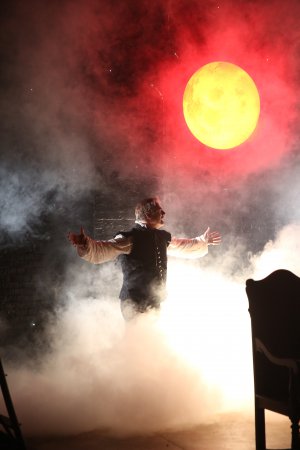Doctor Faustus
While he successful delineates Faustus’ egotism and ennui, Chris Noth’s performance ultimately remains superficial in this iconic role.

Chris Noth and Zach Grenier in a scene from Classic Stage Company’s “Doctor Faustus” (Photo credit: Joan Marcus)
[avatar user=”Victor Gluck” size=”96″ align=”left” ] Christopher Marlowe’s masterpiece Doctor Faustus is a difficult play and offers challenges to both actors and directors. The first problem is that the two existing texts that have come down to us are both corrupted and assumed to have emendations from other hands. Which to do? Second, and possibly more problematic, unlike Shakespeare whom we are more familiar with, it uses earlier models of English theater like the morality plays, proceeds in long monologues rather than in dramatic dialogue, and has little in the way of modern psychology. Basically a long pageant with poetic language, it calls for a large cast and many spectacular scenic effects.
Unfortunately, from the evidence of the two most recent productions at the Classic Stage Company, their directors have not trusted the material, first Hamlet and now Doctor Faustus, both using film and television stars (Peter Sarsgaard and Chris Noth, respectively) not best known for their classic stage roles. Director Andrei Belgrader has used a new adaptation of the Marlowe by David Bridel and himself which combines the two texts and makes cuts and changes but makes the play extremely episodic.
Much of the play is directed using Brecht’s so-called alienation effect in which the audience is constantly reminded that this is all a play, a poor choice for a tragedy that wants to put both awe and fear into the hearts of its listeners. Tony Strages’ set design resembles a circus or vaudeville and much of the performance is played on that level. What is sacrificed is the seriousness of the theological and moral issues. There are continual shifts in tone which simply draw attention to these lapses, rather than add to the meaning.
When we meet him, Dr. John Faustus is a scholar at Wittenberg. Having come to the limits of his studies of logic, medicine, law and theology, he decides to dabble in the forbidden art of necromancy. This leads him to conjure up Mephistopheles who arranges for him to sell his soul to Lucifer for 24 years of pleasure, power and riches. Although his Good Angel calls on him to repent, Faustus waits until the very last minute when it proves to be too late. Critics have not stopped debating whether the play is a cautionary tale about damnation in Christian terms or a critique of Renaissance Christianity which forbade various studies of science and other taboo topics.
Noth, star of Law & Order, Sex and the City, and The Good Wife, captures Faustus’ arrogance, boredom and world weariness. What Belgrader has failed to obtain from him is the tragic grandeur inherent in this role of a man who seeks all knowledge and pays the price for it. Faustus’ death triggers no sense of pity or empathy. Veteran stage and television actor Zach Grenier, the only other member of this cast of nine to play only one role, is a very dour Mephistopheles who does not appear to be having a very good time as the servant of Lucifer.
The low comic scenes are treated as vaudeville burlesques. The lights are brought up as in a nightclub and the actors play off of the audience, actually bringing members up onto the playing area to be part of the comedy. Lucas Caleb Rooney and Ken Cheeseman are very funny in these sequences but they not only tear at the fabric of the play, it is difficult to shift back to the serious parts of the play that follow each such sequence.
Great demands are made on Marina Lazzaretto as Helen of Troy but to little purpose. Walter Jones is both Faustus’ servant Wagner as well as the Chorus narrator, a combination often made, but here it seems to distance the play still further making it all a flashback. The other three actors (Jeffrey Binder, Carmen M. Herlihy, Geoffrey Owens) play a great many small roles without making any deep impression.
While the costumes by Rita Ryack & Martin Schnellinger are generally true to the play’s Elizabethan period, Lucifer unaccountably wears a contemporary white suit with a magician’s cape and red socks. Jason Lyons’ lighting is magical in the scene in which Faustus is shown the planets and the stars, but the rest of the time follows the director’s concept of bringing up the lights for the low comic scenes which remains jarring throughout the performance.
It is to the credit of the Classic Stage Company that they have revived Marlowe’s rarely seen Doctor Faustus and attempted to deal with the problem of the corrupted texts that have come down to us. Unfortunately, the results are uneven and the emotions that should be evoked appear to be stillborn. While he successful delineates Faustus’ egotism and ennui, Chris Noth’s performance ultimately remains superficial in this iconic role.
Doctor Faustus (through July 12, 2015)
Classic Stage Company, 136 E. 13th Street, in Manhattan
For tickets, call 212-352-3101/866-811-4111 or visit http://www.classicstage.org
Running time: two hours and 10 minutes including one intermission







Leave a comment